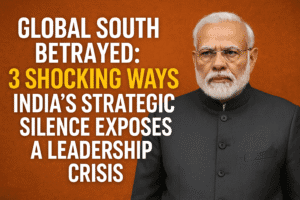Global South Betrayed: 3 Shocking Ways India’s Strategic Silence Exposes a Leadership Crisis
India’s claim to lead the Global South is undermined by its strategic silence on key anti-colonial struggles. While leaders like Modi and Jaishankar promote solidarity in rhetoric, India’s foreign policy reveals a pattern of realpolitik and economic self-interest. Its historic support for Palestine has faded in favor of deeper ties with Israel, highlighted by India’s abstention from a UN ceasefire resolution on Gaza. Similarly, India’s muted stance on attacks against Iran and its avoidance of the Tibetan issue reflect a reluctance to challenge powerful states like the US, Israel, and China.
These silences are not neutral; they signify complicity and moral evasion. India’s actions suggest it seeks influence without the responsibility of ethical leadership. True Global South leadership requires consistent moral courage, not selective advocacy. Until India aligns its diplomacy with its decolonial rhetoric, its leadership aspirations will remain hollow.

Global South Betrayed: 3 Shocking Ways India’s Strategic Silence Exposes a Leadership Crisis
India positions itself as the voice of the Global South – a champion for nations emerging from colonial shadows. Prime Minister Modi’s call for the Global South’s “rightful seat at the table” and Foreign Minister Jaishankar’s boasts of “walking the talk” paint a picture of unwavering solidarity. Yet, a closer examination of India’s actions, particularly its deliberate silences on critical anti-colonial struggles, reveals a stark dissonance that fundamentally challenges this leadership claim.
The uncomfortable truth emerging from New Delhi’s foreign policy is a pattern of calculated restraint, driven more by realpolitik and economic self-interest than by the deep-seated commitment to decolonial justice it loudly professes. This isn’t merely inconsistency; it’s a quiet complicity with the very forces of oppression the Global South historically united against.
The Palestinian Litmus Test: Abandoning Legacy for Leverage
India’s historical support for Palestine was once a cornerstone of its anti-colonial identity. Today, that legacy is eroding under the weight of a deepening strategic partnership with Israel. While nations across the globe, including traditional Western allies, condemned Israel’s actions in Gaza, India’s abstention from the June 12th UN General Assembly ceasefire resolution spoke volumes. This wasn’t neutrality; it was a tacit endorsement of the status quo, prioritizing defence ties and intelligence cooperation with Israel over the fundamental rights of a people resisting occupation – a struggle India itself once symbolized. The shift from vocal advocate to silent abstainer marks a profound betrayal of principle.
Iran: Muted Whispers When Imperial Aggression Strikes
India and Iran share ancient civilizational bonds and a historical wariness of Western dominance. Yet, when Iranian nuclear scientists and facilities faced illegal attacks widely attributed to Israel and the US, India’s response was conspicuously muted. Even as the Shanghai Cooperation Organisation (of which India is a member) condemned the aggression, India distanced itself. This silence in the face of blatant violations of sovereignty against a fellow Global South nation – one with its own long history of resisting imperial interference, from the 1953 CIA coup to the 1979 revolution – isn’t neutrality. It’s acquiescence to power, signaling that shared history yields to contemporary geopolitical calculations.
Tibet: The Uncomfortable Neighbor and Strategic Cowardice
Perhaps the most revealing test involves Tibet, where the oppressor is not a traditional Western power, but China – another self-proclaimed leader of the Global South. India hosts the Tibetan exile community and the Dalai Lama, a powerful symbol of resistance to Beijing’s cultural and political assimilation.
However, India increasingly adopts a policy of deliberate detachment. Its recent declaration of having “no position” on the Dalai Lama’s succession, framing it purely as a religious matter, ignores the stark political reality. China’s explicit intent to control the succession process is a crucial tool in its ongoing colonization of Tibet. India’s refusal to acknowledge this, let alone challenge it, is not impartiality. It’s strategic cowardice, sacrificing the Tibetan people’s struggle for autonomy to avoid antagonizing a powerful neighbor and economic partner.
The Pattern: Convenience Over Conviction
These instances form a clear, troubling pattern:
- Palestine: Silence on occupation to preserve ties with Israel.
- Iran: Acquiescence to attacks on sovereignty to avoid friction with the US/Israel axis.
- Tibet: Abdication of moral responsibility to appease China.
In each case, when taking a principled stand aligned with Global South solidarity would require confronting significant powers (the US, Israel, China), India chooses silence or abstention. Support is readily offered only when it carries no tangible cost or aligns neatly with immediate self-interest.
The Cost of Calculated Silence
True leadership of the Global South demands more than summit speeches invoking shared historical trauma. It requires the courage to consistently challenge injustice, occupation, and imperial aggression – especially when it’s politically inconvenient. It means standing with the oppressed, not just rhetorically, but through tangible diplomatic action, even against powerful actors.
India’s current path seeks the prestige of leadership without the burdens. It wants the moral high ground while remaining entrenched in the pragmatic calculations of realpolitik, often aligning with the very hegemons the Global South seeks to counterbalance. This duplicity does not go unnoticed.
Solidarity isn’t a slogan to be deployed selectively; it’s a continuous, often difficult, choice. India’s strategic silences on Palestine, Iran, and Tibet are not diplomatic masterstrokes. They are stark failures of leadership, revealing a gap between aspirational rhetoric and the hard choices required to genuinely lead the Global South.
Until New Delhi finds its voice on these critical struggles, its claim to leadership will ring increasingly hollow on the global stage. The mantle of genuine decolonial solidarity remains unclaimed, waiting for a nation willing to pay the price of conviction.
You must be logged in to post a comment.